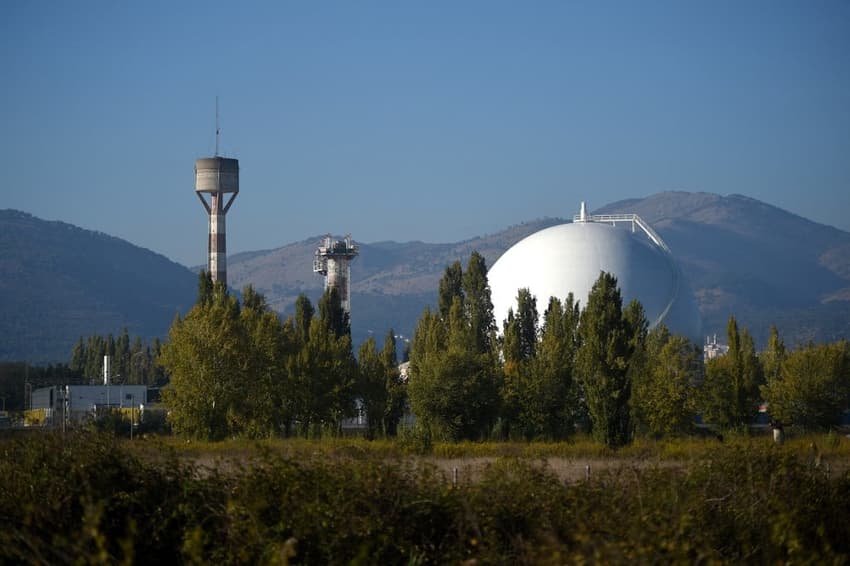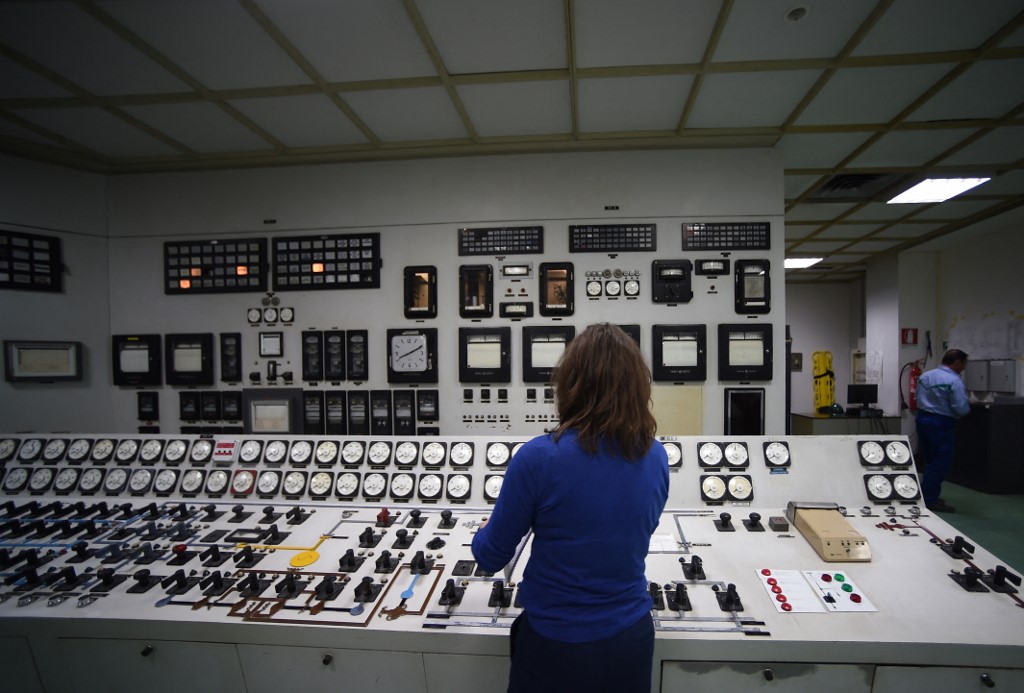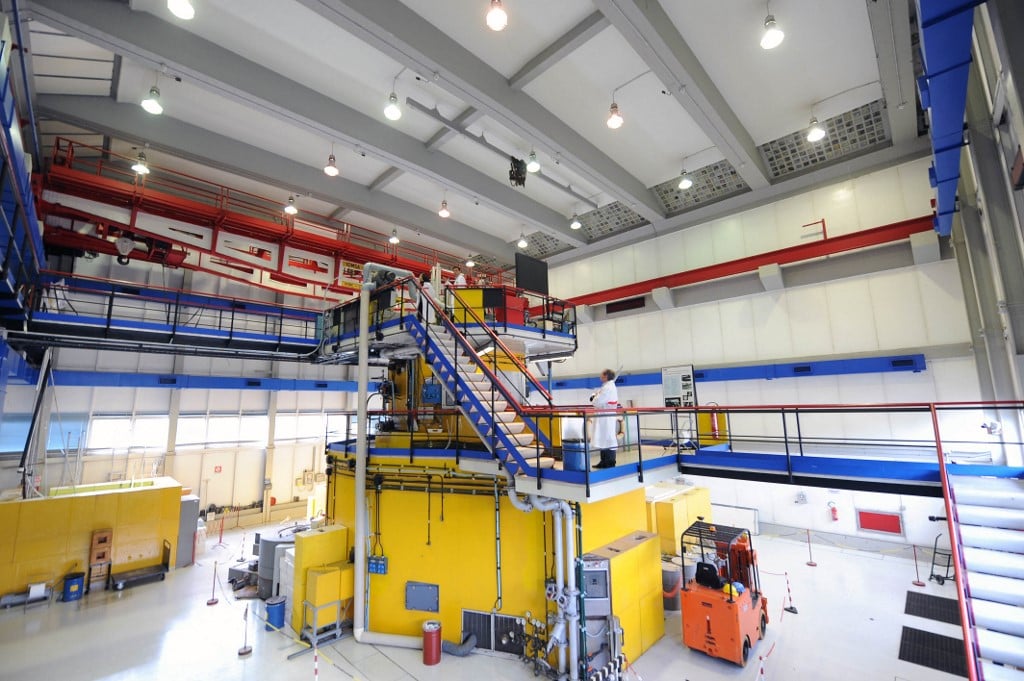EXPLAINED: Is Italy really reconsidering nuclear power?

After rejecting nuclear power twice before, Italian voters may once again be asked to make a choice over the use of fission in the country.
Some 33 years after Italy’s last two power plants were shut down, Italian Deputy Prime Minister Matteo Salvini announced on Sunday the government’s intention to reinstate a nuclear energy programme
“Italy must resume its participation in nuclear energy by the end of this year,” he said, boldly adding that the first batch of nuclear-derived energy “will be inaugurated by this very government in ten years’ time”.
The Italian public has historically been largely opposed to nuclear power, rejecting it via public referendums in 1987 and 2011.
But Salvini has said the results of the second referendum (in which 95 percent voted against nuclear power) were “a product of emotion” following the Fukushima disaster, and he was ready to bank on the success of a new referendum “explaining why Italy needs clean nuclear energy”.
Sunday’s announcement coincided with the creation of a National Platform for Sustainable Nuclear Power, a new body aimed at coordinating efforts over research into nuclear fission, radiation protection, and radioactive waste.
But with two weeks to go until the board of the new national body meets for the first time, many have already expressed doubts over the government’s nuclear revival proposals, especially considering Italy’s history with nuclear power.
Italy’s past with nuclear energy
Italy was one of the first countries in the world to embrace nuclear power in the 1950s, and was the third largest producer of fission-derived energy after the US and UK by the late 60s.
But the national nuclear programme screeched to a halt in the aftermath of the 1986 Chernobyl disaster, when over 70 percent of Italians voted against nuclear power in a referendum, prompting the government to decommission all existing plants.
 Italy's nuclear energy programme was officially shut in 1990 following the results of a referendum on the use of fission in the country. Photo by FILIPPO MONTEFORTE / AFP
Italy's nuclear energy programme was officially shut in 1990 following the results of a referendum on the use of fission in the country. Photo by FILIPPO MONTEFORTE / AFP
Nearly twenty years after the shutdown, a government led by the late Silvio Berlusconi called for the return of nuclear energy in the country.
But early plans for the construction of eight reactors were abandoned after another referendum, held following the 2011 Fukushima disaster, produced even more overwhelming results, with 94 percent of voters against nuclear power.
So why is nuclear power back on the table?
In the lead up to the September 2022 national election, the joint campaign manifesto of Brothers of Italy, the League and Forza Italia, which form the current ruling coalition, was short on specifics when it came to energy policies.
Nevertheless, the manifesto referred to “clean and safe nuclear power” as one of the possible ways to achieve national energy independence along with renewable sources.
Salvini, a self-styled “dedicated nuclearist”, doubled down on the idea last July, saying that Italy “cannot afford to rule out any energy source”, let alone nuclear power, in its bid to wean itself off foreign energy supplies and hit the EU’s 2050 zero-emission target.
READ ALSO: A winter energy crunch in Europe looks a distinct possibility
On their part, opposition forces have so far criticised the government’s wish to reintroduce nuclear power.
Giuseppe Conte, the leader of the anti-establishment Five Star Movement, has said that nuclear power would do little to solve Italy’s short-term energy issues as new, safer fission technologies “will only be ready in 15 to 20 years”.
Further, “we have already rejected [nuclear power] via two referendums” and “must not turn back,” said Conte.
 Italy's proposed nuclear energy revival reportedly involves fourth-generation reactors, which scientists believe to be safer than older models. Photo by TIZIANA FABI / AFP
Italy's proposed nuclear energy revival reportedly involves fourth-generation reactors, which scientists believe to be safer than older models. Photo by TIZIANA FABI / AFP
Proposals to revive nuclear power are a divisive issue across Europe.
Last week, German Chancellor Olaf Scholz ruled out a future return to fission, labelling the issue “a dead horse” following calls from government coalition partner Free Democratic Party for a halt to the dismantling of the last remaining nuclear plants.
Conversely, earlier this year, the UK’s defence secretary Grant Shapps condemned the neglect of Britain’s nuclear industry as a “colossal mistake” and earmarked £20 billion for a fleet of new reactors.
Does Italy have a plan yet?
Though further details will likely emerge after the National Platform for Sustainable Nuclear Power’s first meeting on September 21st, Italy will be focusing on “fourth-generation fission”, according to Environment and Energy Security Minister Gilberto Pichetto Fratin.
Fourth-generation nuclear power involves a system of plants and facilities that are believed to overcome some of the shortcomings of current plants, including low fuel efficiency, safety risks and environmental impact.
Though the government hasn’t yet given any details on exactly how much the creation of a national nuclear energy programme based on fourth-generation technology would cost, Nicola Armaroli, a researcher at Italy’s National Research Council (CNR) believes that the final bill may be around 200 billion euros.
As for the timeline of the proposed return to nuclear power, while Salvini seems confident that production will start in ten years’ time, Armaroli believes that Italy wouldn't see the finish line on the nuclear front “before 20 years”.
Fourth-generation reactors are currently still in the trial stages, with the first models only expected to enter the market after 2030.
Comments
See Also
Some 33 years after Italy’s last two power plants were shut down, Italian Deputy Prime Minister Matteo Salvini announced on Sunday the government’s intention to reinstate a nuclear energy programme
“Italy must resume its participation in nuclear energy by the end of this year,” he said, boldly adding that the first batch of nuclear-derived energy “will be inaugurated by this very government in ten years’ time”.
The Italian public has historically been largely opposed to nuclear power, rejecting it via public referendums in 1987 and 2011.
But Salvini has said the results of the second referendum (in which 95 percent voted against nuclear power) were “a product of emotion” following the Fukushima disaster, and he was ready to bank on the success of a new referendum “explaining why Italy needs clean nuclear energy”.
Sunday’s announcement coincided with the creation of a National Platform for Sustainable Nuclear Power, a new body aimed at coordinating efforts over research into nuclear fission, radiation protection, and radioactive waste.
But with two weeks to go until the board of the new national body meets for the first time, many have already expressed doubts over the government’s nuclear revival proposals, especially considering Italy’s history with nuclear power.
Italy’s past with nuclear energy
Italy was one of the first countries in the world to embrace nuclear power in the 1950s, and was the third largest producer of fission-derived energy after the US and UK by the late 60s.
But the national nuclear programme screeched to a halt in the aftermath of the 1986 Chernobyl disaster, when over 70 percent of Italians voted against nuclear power in a referendum, prompting the government to decommission all existing plants.

Nearly twenty years after the shutdown, a government led by the late Silvio Berlusconi called for the return of nuclear energy in the country.
But early plans for the construction of eight reactors were abandoned after another referendum, held following the 2011 Fukushima disaster, produced even more overwhelming results, with 94 percent of voters against nuclear power.
So why is nuclear power back on the table?
In the lead up to the September 2022 national election, the joint campaign manifesto of Brothers of Italy, the League and Forza Italia, which form the current ruling coalition, was short on specifics when it came to energy policies.
Nevertheless, the manifesto referred to “clean and safe nuclear power” as one of the possible ways to achieve national energy independence along with renewable sources.
Salvini, a self-styled “dedicated nuclearist”, doubled down on the idea last July, saying that Italy “cannot afford to rule out any energy source”, let alone nuclear power, in its bid to wean itself off foreign energy supplies and hit the EU’s 2050 zero-emission target.
READ ALSO: A winter energy crunch in Europe looks a distinct possibility
On their part, opposition forces have so far criticised the government’s wish to reintroduce nuclear power.
Giuseppe Conte, the leader of the anti-establishment Five Star Movement, has said that nuclear power would do little to solve Italy’s short-term energy issues as new, safer fission technologies “will only be ready in 15 to 20 years”.
Further, “we have already rejected [nuclear power] via two referendums” and “must not turn back,” said Conte.

Proposals to revive nuclear power are a divisive issue across Europe.
Last week, German Chancellor Olaf Scholz ruled out a future return to fission, labelling the issue “a dead horse” following calls from government coalition partner Free Democratic Party for a halt to the dismantling of the last remaining nuclear plants.
Conversely, earlier this year, the UK’s defence secretary Grant Shapps condemned the neglect of Britain’s nuclear industry as a “colossal mistake” and earmarked £20 billion for a fleet of new reactors.
Does Italy have a plan yet?
Though further details will likely emerge after the National Platform for Sustainable Nuclear Power’s first meeting on September 21st, Italy will be focusing on “fourth-generation fission”, according to Environment and Energy Security Minister Gilberto Pichetto Fratin.
Fourth-generation nuclear power involves a system of plants and facilities that are believed to overcome some of the shortcomings of current plants, including low fuel efficiency, safety risks and environmental impact.
Though the government hasn’t yet given any details on exactly how much the creation of a national nuclear energy programme based on fourth-generation technology would cost, Nicola Armaroli, a researcher at Italy’s National Research Council (CNR) believes that the final bill may be around 200 billion euros.
As for the timeline of the proposed return to nuclear power, while Salvini seems confident that production will start in ten years’ time, Armaroli believes that Italy wouldn't see the finish line on the nuclear front “before 20 years”.
Fourth-generation reactors are currently still in the trial stages, with the first models only expected to enter the market after 2030.
Join the conversation in our comments section below. Share your own views and experience and if you have a question or suggestion for our journalists then email us at [email protected].
Please keep comments civil, constructive and on topic – and make sure to read our terms of use before getting involved.
Please log in here to leave a comment.